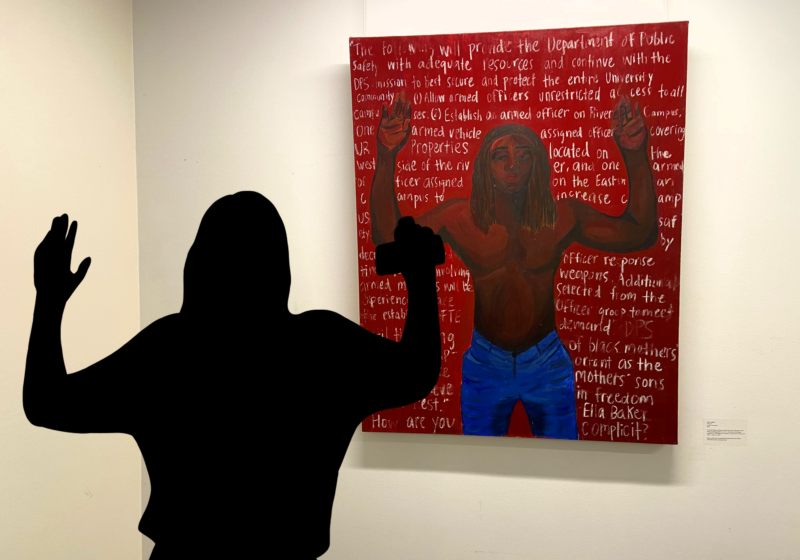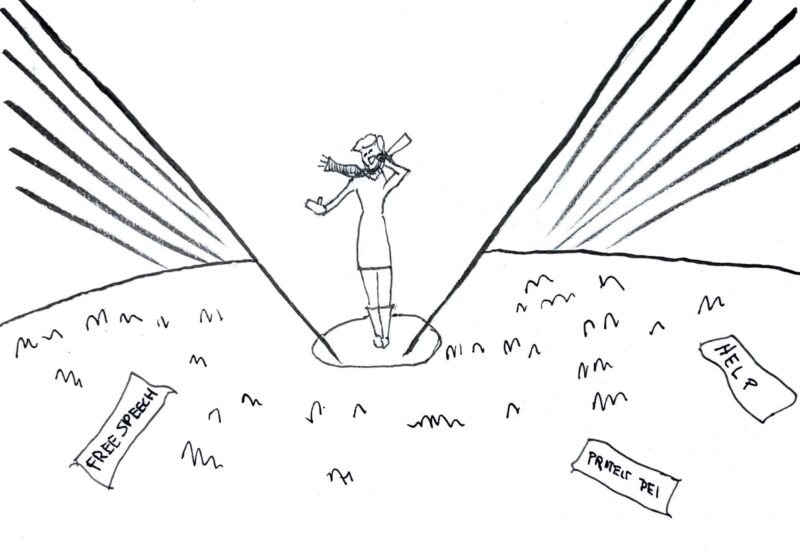On Feb. 26, the anniversary of Trayvon Martin’s shooting, a picture circulated of a student in front of a painting in Rush Rhees Library, mirroring the “Hands up” pose of the black man in the painting.
The online reaction was swift. The photo was circulated and criticized for mocking and trivializing a serious issue. The student in the picture posted an apology later that night.
It wasn’t long until the online reaction became its own controversy. Some argued the outrage was too much, while others argued it didn’t extend far enough.
Regardless of where you stand, it’s important to place incidents like this in a greater context. The police brutality experienced in Rochester and across the country makes this seemingly one-off incident part of a national story.
But it’s also part of a UR-specific story. This student’s act is yet another thread in a larger tapestry that displays the divisions in UR’s culture. The division is one of both experience and awareness.
In the past 10 years, UR has seen a Confederate flag hung from a dorm window in 2013, racist comments and anonymous threats on YikYak in 2015, white nationalist cards and fliers posted in Rush Rhees Library and the Rochester area in spring 2019, and the N-word written in a mirror in a residence hall last semester. With each new controversy or incident, it becomes clear that these issues seem to disturb only some groups, while for others it is background noise.
In her apology, the student in the picture said she was unaware of the message depicted in the painting. But if a student can spend over a year at this school and still not think twice about posting a picture like that, we’re doing something wrong.
So what can we do?
First, we need to institutionalize diversity awareness.
As the Minority Student Association Board president said when interviewed by the CT, the work to make UR students true allies cannot be left only to the Burgett Intercultural Center.
Mandatory workshops during first-year orientation and for Greek life organizations and ResLife are good steps, but only if everyone takes it seriously — and even then, they’re not enough to ensure a genuine understanding of different racial and cultural backgrounds.
UR is an educational institution, and diversity awareness must become a part of that education. Like WRT 105 courses, addressing diversity, bias, and -isms of all kinds should be a foundational piece of how we learn here. It shouldn’t just be a single skippable workshop on the weekend.
Racism isn’t a one-time event, so the responses shouldn’t be either.
There also needs to be a better understanding of what happens when you commit a bias-related offense.
When you violate conduct rules — say, underaged drinking — you know what the next steps, meetings, classes will be. But when it comes to acts and accusations of bigotry, nobody knows what will happen or how the issue will get resolved.
If formal channels exist to deal with these problems, we as students don’t know what they look like. As we’ve seen on social media in the past days, actions have consequences. UR needs to make clear what those consequences are.
For some students, being at UR can be like being in a bubble. We can ignore all of the issues of the outside world because we have our own little universe with responsibilities, food, and shelter. But that’s a fantasy afforded only to the privileged. Like everything else, UR doesn’t exist in a vacuum. We’ve seen repeatedly this year that the UR community is deeply affected by issues from all over the world. Just take a look at what’s happening now with coronavirus.
Racism exists everywhere, and this institution is no exception. We must accept that, and act on it.
The Editorial Board is a weekly Opinions article representing the view of the Campus Times, co-written by Editor-in-Chief Wil Aiken, Publisher An Nguyen, Managing Editor Efua Agyare-Kumi, Features Editor Abhishek Makhun and Opinions Editor Hailie Higgins.



